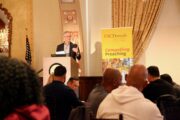So much for the secularization thesis. Or maybe we could develop an alternative explanation and call it the “Spiritualization Thesis.” Americans are, apparently, as interested in religious and spiritual activities as ever, including prayer and seeking out various forms of spiritual guidance and direction. Religion and spirituality is often presented in a fairly undifferentiated manner, varying only in the different types of religions or spirituality observed. In a forthcoming book, Growing Up in America: The Power of Race in the Lives of Teens (Stanford University Press, 2010), however, we—Brad Christerson, Korie Edwards, and I—focus on the four most important institutions that in combination serve to socialize young Americans: family, school, peers, and religion.
It turns out that teens of different races/ethnicities experience and understand religion and its demands—assuming they think it has any real claim on their lives—in significantly different ways. For example, on issues of religious practice, such as prayer and scripture reading, African American teens tend not only to pray and read more than teens of other race/ethnicities, but the content of their practice is more likely to include an other-directed orientation than teens of other race/ethnicities. Latino teens are the most similar to African American teens in their religious concern for others, although for them, this is understood primarily as a support for their families. Asian teens in contrast, are the most pragmatic in their approach to religious belief and practice, in general employing a “pick and choose” approach, with the intention to please their parents by their choices. White teens are by far the most individualistic and self-oriented in their beliefs and practice. Religion for white teens generally is about them getting something they need, or to make themselves feel better about themselves at particular points in their lives. Prayer, for white teens, is not unlike that pull-cord, seen in old black-and-white movies, that the rich socialite tugs to summon the butler to do her bidding.
So what’s the punch-line? Race matters. Even in things religious.
Richard Flory is the executive director of the USC Center for Religion and Civic Culture.






